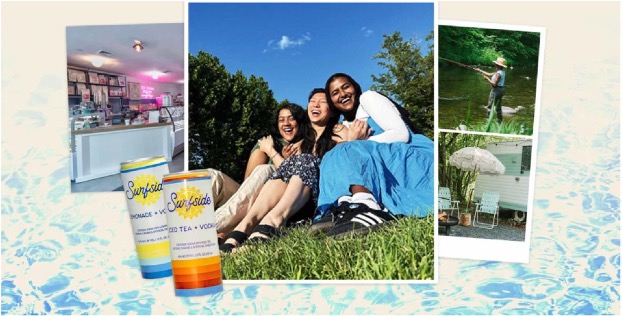
They Call It Lumpy Cash Flow: How Seasonal Business Stretch 3 Months of Sales Year-Round
Beverage companies are turning to unique new formulations – including one containing a meteorite – for recent product launches.

Over the next three months, Tara Glick’s calendar is filled with what she calls “blackout dates”
The 39-year-old Brix Haus Ice Cream chain founder won’t be going out of town or taking any vacation days through the end of August. She won’t be scheduling any hair cuts or doctor’s appointments, either. The only place Glick’s friends will be able to see her at all is at one of her three ice cream parlors in Brooklyn – where she’ll be working
all summer, bringing in half of her business’s annual revenue.
This “zero to one hundred” seasonal business crush is not for the meek, says Glick, who launched her first ice cream shop in November 2022. It’s like staring down a tsunami, she explains: “You’re looking at the wave approaching the shore and you’re trying to time it perfectly.”
But there are rewards for founders who can surf this perennial challenge. A few of them spoke with Inc. about capitalizing on the summer surge, maximizing sales, and stockpiling enough cash to float through the offseason.
Prepare,Prepare,Prepare
Location is key for retail businesses – obviously. But when it comes to seasonal businesses, off-season preparation is just as vital.
In beach towns, lakefronts, and other summer vacation hot spots, the peak season tends to last about 12 weeks. With such a short window to capitalize on demand) founders must often start prepping for the incoming swell as early as the winter or even fall. That includes conducting repairs, ordering supplies) and stocking inventory.
These investments can be costly: Picture mass hiring drives and inventory orders. That’s why, when business owners do start generating revenue, they need to both maximize sales and stockpile enough cash to float them throughout the year.
Managing this sort of “lumpy cash flow” can be a tough task, says Olivia Micallef, COO of the San Francisco-based cash flow and financing platform Settle, which works with small and seasonal businesses. Basing future needs on past experience is certainly a good first step for the necessary financial modeling. But even comprehensive historical sales data is only so predictive.
“Think very) very carefully about how you forecast,” and don’t let that be all you do, says Micalle£ “You need to have good contingency plans on what to do if the revenue doesn’t come in in the way you would expect.”
Entrepreneurs also need to keep some cash on the sidelines, suggests Vincent D’Alessandro, president of community banking at Toms River, New Jersey-based OceanFirst Bank. “The last thing you want for these seasonal businesses is to have all of their money get blown through in the offseason and not be prepared with any cash reserves to get their businesses started,” he says.
Don’t Overhire
Part of meting out resources across the year involves trimming costs whenever possible. With her ice cream shops running on such tight margins, especially at the beginning of the season, Glick under-staffs on purpose, scheduling one employee per shift to start off the summer.
“Staffing is one of our most expensive costs, so you don’t want to over-staff,” she says. “I’d rather be a little understaffed and have to jump in and help.”
Start the Season Early
Boheme Retreats founder Keva Niver turns to her repeat customers first to prime her revenue streams. A glamping site in the Western Catskills of New York, Boheme Retreats offers vacation stays between May and October. To get her fleet of vintage RV campers ready for the season, which peaks in June and July, the 44-year-old entrepreneur taps her customer email list, and offers discounts for early-bird bookings.
Securing that working capital in the offseason is crucial, Niver says. “Make sure you have more than enough in the beginning, because you’re going to need it.”
Most ofNiver’s customers book trips two or three weeks out, but the deposits from the ten percent that book further in advance are vital, sustaining her business through the six months when it’s not operational. “That was super helpful for me as a small business,” she says.
Dip Into Credit Lines
Clement Pappas, the SO-year-old founder and CEO of Surfside, a Philadelphia-based canned iced tea vodka brand, has been stocking his warehouses with racks of inventory since January. More than half of the company’s annual revenue comes in between June and September, when people buy Surfside at, say, a Major League baseball game or at a beach bar along the Jersey Shore. Financing that manufacturing overdrive is challenging, he says. The only option is drawing down his credit lines.
“We have to sit there in our slow months when we’re not generating a lot of revenue and then borrow money to build up inventory,” says Pappas, whose company has tripled annual revenue for each of the last two years and sold 1.7 million cases in the past twelve months.
As costly as interest rates have gotten, the alternative – delayed orders to vendors – is worse, he says. “The most expensive thing you can do is be out of stock,” says Pappas. “When you get into a situation where we don’t have the product, and then you go into triage mode.
What are we going to allocate to who? You’ll never get that sale back.”
Say Yes to (Every) Request
Every warm, sunny day is a gift for seasonal business, says Glick, “because we know how bad some of the months will be in the winter.”
And it’s not just the winter that can be challenging. Rainy weekends can cut foot traffic sales in half, founders say, while sweltering temperatures and humidity keep people at home in the air-conditioning.
To circumvent those inevitable downpours, Glick’s got a good umbrella (strategy). “This summer, we’re saying ‘yes’ to everything,” she says. That means more birthday parties and more catering gigs. “It’s bracing yourself for three months of all out, take everything you can get.”
She adds, “I’ll take a breath in October.”



